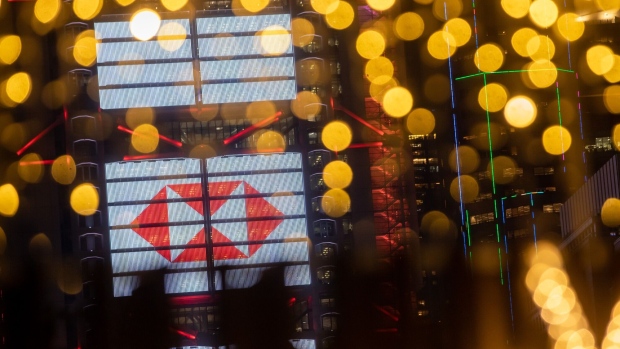Feb 20, 2024
HSBC’s Earnings Sink on $3 Billion Impairment on Chinese Bank
, Bloomberg News

(Bloomberg) -- HSBC Holdings Plc reported fourth-quarter profit fell 80% after taking unexpected charges on holdings in a Chinese bank and from selling its French retail operations. Shares slid in London.
Pretax profit fell to $1 billion in the final three months of last year from $5.05 billion in the year-earlier period, the London-headquartered bank said in a statement. The lender took a $3 billion charge on its holding in Bank of Communications Co. and $2 billion on its French sale.
“That has no impact on our capital position of any significance, it does not prohibit distribution,” Chief Executive Officer Noel Quinn said of the BoCom charge in an interview with Bloomberg Television. “It is a technical accounting issue. I also want to reiterate, we have strong confidence in the China economy.”
While rising interest rates globally boosted HSBC’s full-year earnings to a record, the bank has faced headwinds over the past year in China, one of its key growth markets. The ongoing real estate meltdown has not only hurt the world’s second-largest economy, but has forced HSBC to set aside money to cover potential losses, including $200 million in the quarter.
At the same time, HSBC announced a $2 billion share buyback and a fourth-quarter interim dividend of 31 cents a share. Quinn warned in the statement that the macro environment remains “challenging” and the outlook remains uncertain amid geopolitical volatility in Europe and the Middle East.
The bank’s shares fell as much as 7.5% in London on Wednesday, the biggest intraday drop since October 2022.
Asia Pivot
HSBC is several years into a strategy of pivoting its business increasingly toward the faster-growing markets of Asia where the bank makes most of its money. Disposals of businesses in France and Canada have been balanced by acquisitions of insurance and wealth management assets in Asia, a region with swelling ranks of the wealthy.
The decision to take the $3 billion charge on the BoCom stake was not due to conversations with external parties like regulators, Quinn said on a media call. It was tied to a regular, internal process known as the “valuation in use” test, which compares that value to the stake’s carrying value, he said.
HSBC initially paid $1.75 billion for a 19.9% stake in Shanghai-based BoCom in August 2004.
“We believe our partnership with BoCom has been a good partnership for 20 years, and that status has not changed at all,” Quinn said.
HSBC cut its overall exposure to China commercial real estate to $12.1 billion, down by $4.6 billion from 2022. Its US exposure was cut by 27% to $3.9 billion.
What Bloomberg Intelligence Says
The $3 billion impairment taken for HSBC’s stake in Bank of Communication appears to rightly capture the deteriorating outlook for China’s economy and shouldn’t be a surprise, with no dent to the lender’s capital (CET1 at 14.8% in 4Q) nor dividend capacity. Encouragingly, management confirms the 50% payout ratio and is extending the share buyback.
Tomasz Noetzel, BI analyst
Further acquisitions are in the cards. Quinn said last year that if he saw the opportunity to grow the business through more bolt-on deals, he would do it. But he also cautioned against the idea that the bank would engage in major acquisitions.
“You can see our confidence in China is still strong, and we’re investing and we’ve done three bolt-ons there,” Quinn said Wednesday. “We’ll continue to look for bolt-ons, particularly in our wealth management business.”
Geopolitical tensions remain an issue for the bank given its position as a financial bridge between the West and China. Last year, the company faced a political backlash in the UK after its then head of public affairs, Sherard Cowper-Coles, made controversial remarks about the British government’s handling of its relationship with China.
In 2024, HSBC expects net interest income associated with its banking activities to be at least $41 billion after such revenue soared to $44.1 billion in 2023. Potential declines in benchmark interest rates and the company’s planned disposals of its retail bank offerings in Canada and France are both likely to impact that metric this year, Chief Financial Officer Georges Elhedery said.
At the same time, the company also expects expenses to rise by about 5% in 2024 due to an increase in staff compensation and higher technology spending.
“We have previously highlighted that much of the tailwind for HSBC seen in recent years is set to reverse as we face falling interest rates,” Perlie Mong and Ed Firth, analysts at Keefe, Bruyette & Woods, said in a note to clients. “This is reflected in softer guidance today, which is particularly disappointing.”
Other highlights from the earnings:
- Argentine President Javier Milei’s move to devalue the peso by more than 50% hurt the bank’s profit before taxes by $548 million in the fourth quarter
- Expected credit losses were $1 billion for the quarter, down $400 million from a year earlier
- The company’s business in Singapore generated $1.1 billion in profit before taxes for the year, the first time it breached the $1 billion level
--With assistance from Francine Lacqua.
(Updates with additional guidance starting in 15th paragraph.)
©2024 Bloomberg L.P.






